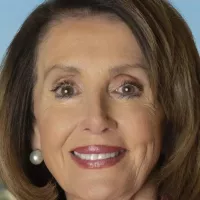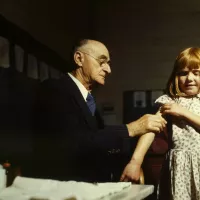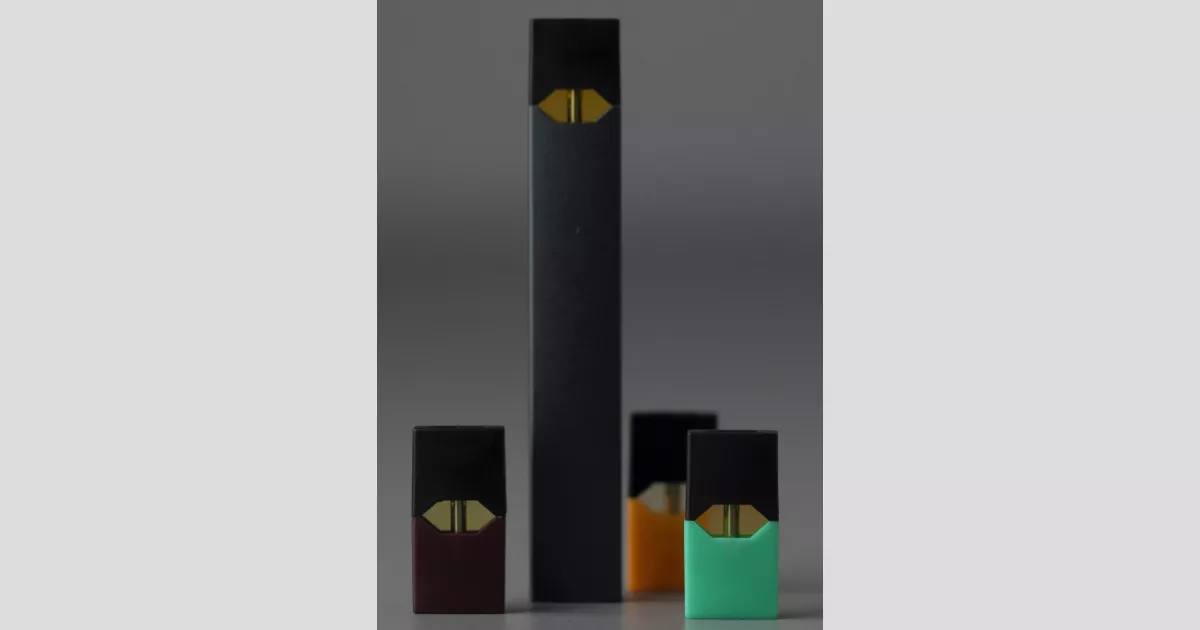Juul Labs is an American e-cigarette company, formerly part of Pax Labs, known for its flagship product, the Juul. Co-founded by Adam Bowen and James Monsees, Juul gained popularity for its sleek design and use of nicotine salt cartridges when it launched in 2015. In 2017, Juul Labs became an independent entity before Altria acquired a significant 35% stake in 2018. Juul's original device was discontinued in 2023, replaced by the Juul 2. The company faced considerable scrutiny and controversy related to youth vaping and its marketing practices.
1975: National Drug Trends study began
The National Drug Trends study began in 1975.
2005: Adam Bowen and James Monsees develop Ploom
In 2005, Adam Bowen and James Monsees, then graduate students at Stanford University, developed an e-cigarette called Ploom.
2007: Bowen and Monsees start Ploom business
In 2007, Adam Bowen and James Monsees started a business under the name Ploom.
May 22, 2015: Juul Labs, Inc. founded
Juul Labs, Inc. was founded on May 22, 2015.
June 2015: Juul electronic cigarette introduced by Pax Labs
In June 2015, Pax Labs introduced the Juul electronic cigarette.
2015: Stanford University study analyzes perception of e-cigarettes
A 2015 Stanford University study found that some adolescents believed e-cigarettes did not contain nicotine, only water vapor.
2015: Juul device first sold
In 2015, Adam Bowen and James Monsees co-founded Juul Labs as part of Pax Labs, and started selling the Juul device.
2015: Campaign for Tobacco-Free Kids voiced concern over Juul's marketing
In 2015, John Schachter voiced concern regarding the youth of men and women portrayed in Juul's advertising, particularly in combination with the design, stating that 'We're seeing more and more irresponsible marketing of unregulated products such as e-cigarettes.'
2015: Juul receives US patent for nicotine salt preparation
In 2015, Juul received a US patent for its nicotine salt preparation, which is used in its e-cigarettes.
2015: Juul spent $2.2 million on marketing
Juul spent $2.2 million on marketing in 2015 and 2016, with $1 million going to online marketing.
2016: PAX Labs CEO states Juul should not be used by those under the legal age
Former PAX Labs CEO Goldman said to Fortune in 2016 that "Juul should not be used by those under the legal age, nor should any nicotine products, as stated by the U.S. Surgeon General."
2016: Sales of Juul increased 700%
In 2016, sales of Juul increased 700%.
2016: CDC and FDA study on e-cigarette flavor use
In a 2016 study by the CDC and FDA, it was found that 31% of middle and high school students who used e-cigarettes claimed they used them because of the availability of flavors.
2016: Juul spent $2.2 million on marketing
Juul spent $2.2 million on marketing in 2015 and 2016, with $1 million going to online marketing.
July 2017: Juul Labs spun out of PAX Labs
In July 2017, Juul Labs was spun out of PAX Labs as an independent company, with Tyler Goldman named as CEO of Juul.
September 2017: Juul's employee count reaches 200
In September 2017, Juul had 200 employees.
December 2017: Kevin Burns replaces Tyler Goldman as CEO
In December 2017, Kevin Burns replaced Tyler Goldman as CEO of Juul.
2017: Juul becomes most popular e-cigarette in the U.S.
By the end of 2017, after a large social media marketing campaign, Juul became the most popular e-cigarette in the United States.
2017: Juul Labs spun off from Pax Labs
In 2017, Juul Labs was spun off from Pax Labs to become its own company.
2017: Juul's revenue was approximately $245 million
Juul's revenue in 2017 was approximately $245 million.
2017: Truth Initiative survey reveals misunderstanding about nicotine content in Juul products
The 2017 Truth Initiative survey found 63% of teens and young adults did not understand that the Juul products they used always contains nicotine.
2017: Percentage of 12th grade students who reported vaping nicotine
The percentage of 12th grade students who reported vaping nicotine was 11% in 2017.
April 2018: FDA Commissioner states nicotine in Juul leads to addiction
In April 2018, FDA Commissioner Dr. Scott Gottlieb stated that the nicotine in Juul is sufficient to result in addiction and can rewire an adolescent's brain, leading to years of addiction.
April 2018: Martha Coakley joins Juul
In April 2018, former Massachusetts Attorney General Martha Coakley joined Juul to coordinate lobbying efforts and advocate against underage usage.
May 2018: Juul started selling in Israel
In May 2018, Juul started selling in Israel, which did not regulate e-cigarettes at the time.
May 2018: Truth Initiative survey on Juul acquisition
In May 2018, a Truth Initiative survey found that 74% of Juul users ages 12–17 obtained their Juul device from a brick and mortar store, 52% from a friend or family member, and 6% online.
June 2018: Juul raises $1.2 billion in financing
In June 2018, Juul reportedly raised $1.2 billion in a financing round that valued the company at more than $16 billion.
July 2018: Juul Labs was the sixth-most valuable US startup
According to Dow Jones VentureSource, Juul Labs was the sixth-most valuable US startup in July 2018, behind Uber and Airbnb.
July 2018: Juul e-cigarette manufactured in China, pods in the US
As of July 2018, the Juul e-cigarette is manufactured in Shenzhen, China, while the pods are made in the United States.
July 2018: Juul announced launch in the United Kingdom
In July 2018, Juul announced it would launch in the United Kingdom with lower nicotine strengths to comply with UK regulations. The UK was chosen as an early launch market as it had the world's most supportive government when it came to encouraging smokers to vape.
July 2018: Juul raises $650 million
In July 2018, Juul raised $650 million, resulting in a valuation of $15 billion.
August 2018: Juul introduced products in Canada
In August 2018, Juul introduced its products in Canada, starting with an online launch before introducing them to vape shops, gas stations, and convenience stores in early September.
August 2018: Juul introduces 3 percent strength pods
In August 2018, Juul introduced pods in 3 percent strengths for its mint and Virginia tobacco flavors, equivalent to 30 mg/ml.
August 2018: Israel banned Juul's products
Israel banned Juul's products in August 2018, citing public health concerns, because it delivers nearly three times Israel's recommended amount of 20 mg/ml of nicotine.
September 2018: Juul achieves 72% market share
As of September 2018, Juul had a market share of 72% in the United States.
September 2018: Juul implemented a new marketing code
In September 2018, Juul implemented a new marketing code to avoid the appearance of targeting youth. Changes included only showcasing former smokers age 35 or older in ads, no longer featuring models on social media, removing social media accounts that marketed online, and adding the label "the alternative for adult smokers" to its packaging and many of its ads.
October 2018: Study reveals high Juul usage among teenagers
An October 2018 study revealed that 9.5% of teenagers aged 15-17 and 11% of young adults aged 18-21 currently use Juul, with teenagers being 16 times more likely to use Juul than 25-34 year olds.
October 2018: Juul Labs acquires VMR Products LLC
In October 2018, Juul Labs, Inc. purchased VMR Products LLC, the parent company of V2 e-cigarettes, for $75 million to gain access to the Chinese market.
October 2018: Juul changes age-verification policies
In October 2018, Juul changed its age-verification policies in response to FDA pressure, with employees manually checking drivers licenses against public records for exact matches, rejecting anyone under 21 but also rejecting or deterring many adults.
November 2018: Juul shut down social media accounts
As of November 2018, Juul shut down their social media accounts in response to FDA crackdown.
November 2018: Juul discontinued flavored pods
In November 2018, Juul discontinued all flavored pods in an effort to prevent the increase in teen usage.
December 20, 2018: Altria acquires 35% stake in Juul
On December 20, 2018, Altria acquired a 35% stake in Juul Labs for $12.8 billion, and Juul received a $2 billion bonus to distribute among its 1,500 employees.
2018: Juul's social media activities correlated with retail sales
A 2018 study found that 'Juul's social media activities were highly correlated with Juul retail sales.'
2018: Campaign for Tobacco-Free Kids president says Juul design "misleads about risk" of addiction
In 2018 Matt Myers, president of Campaign for Tobacco-Free Kids, said the design of Juul "misleads about risk" of addiction.
2018: Juul accounted for over 70% of the US e-cigarette market
In 2018, Juul accounted for over 70% of the US e-cigarette market as monitored by Nielsen.
2018: Increasing rates of Juul addiction in teenagers
In late 2018, news reports noted increasing rates of Juul addiction in teenagers, which negatively impacts brain development and relationships. Concern was expressed about the lack of vaping cessation treatments for adolescents.
2018: Adolescent e-cigarette use increases, including Juul
The National Drug Trends of 2018 revealed an increase in adolescent use of e-cigarettes, including the Juul. The increase in vaping rates from 2017 to 2018 was the largest gap recorded since the study began in 1975.
January 2019: Juul announced $10 million advertising campaign
In January 2019, Juul announced a $10 million advertising campaign for cable television and radio, targeting current adult smokers in an attempt to rebrand Juul as a switching product.
January 2019: Juul announced plans for launch in India
In January 2019, Juul announced plans for a launch in India, prompting concerns from the Ministry of Health and Family Welfare regarding the derailment of anti-tobacco programs. Juul e-cigarettes are not legally available in India and are commonly sold on the gray market.
January 18, 2019: FDA public hearing on youth vaping cessation
On January 18, 2019, the FDA scheduled a public hearing on youth vaping cessation.
February 2019: Breja disagreed with selling old pods
In February 2019, Breja disagreed with selling Juul pods that were close to a year old.
March 2019: Breja fired after voicing concerns
In March 2019, Siddharth Breja contends he was fired a week after voicing concerns regarding Juul's contaminated products.
March 2019: Juul pitching itself to employers and insurers
In March 2019, it was reported that Juul was pitching itself to employers and insurers to help their employees stop smoking cigarettes, offering discounted products, coaching, and support.
May 2019: Juul launched in South Korea and Ireland
In May 2019, Juul launched in South Korea and Ireland.
June 13, 2019: House of Representatives launches investigation into Juul Labs
On June 13, 2019, the United States House of Representatives launched an investigation into Juul Labs regarding its business deal with Altria, social media and advertising practices, and communications.
June 2019: Juul launched in Ukraine and announced plans for Philippine market
In June 2019, Juul launched in Ukraine and announced plans for their products to be available in the Philippine market.
June 2019: San Francisco Bans E-cigarette Sales
In June 2019, the City of San Francisco passed legislation banning the sale of e-cigarettes online as well as offline, and a separate ordinance preventing e-cigarette manufacturers from occupying city-owned property.
July 2019: Juul promoted as smoking cessation to kids in schools
In July 2019, Juul spent thousands of dollars to promote Juul as a smoking cessation to kids in schools, making false claims about it being 'completely safe' and presenting opportunities for teens to become influencers for the company.
August 2019: Juul explores deposit system for pods
In August 2019, Juul Labs was exploring an option similar to a deposit system for Juul pods to reduce marine pollution, emphasizing its commitment to environmental sustainability.
September 9, 2019: FDA Warns Juul on Marketing Practices
On September 9, 2019, the US FDA warned Juul to stop its deceptive marketing practices.
September 2019: Potential ban on flavored e-cigarettes
In September 2019, President Donald Trump announced a potential ban on a majority of flavored e-cigarettes with the exception of menthol.
September 25, 2019: Kevin Burns steps down as CEO of Juul
On September 25, 2019, Kevin Burns stepped down as CEO of Juul, and K.C. Crosthwaite from Altria took over the role.
September 29, 2019: Juul sponsored event at Conservative Party Conference
On September 29, 2019, Juul Labs sponsored a reception in celebration of the Conservative Party's bright new thinkers at the Conservative Party Conference.
September 30, 2019: Juul ceases support for Proposition C
On September 30, 2019, Juul announced it will no longer actively support Proposition C, which aimed to rescind the ban on flavored e-cigarettes in San Francisco.
October 1, 2019: Juul's Astroturfing Campaign
On October 1, 2019, it was reported that Juul had set up an astroturfing campaign called the Switch Network, intended to recruit consumers to protest restrictions that Juul called "unfair and misguided".
October 2019: Juul plans to lay off 500 workers
In October 2019, Juul planned to lay off approximately 500 workers by the end of the year, and several executives departed the company.
October 2019: Lawsuit filed by former Juul VP
In October 2019, a lawsuit was filed in US District Court for the Northern District of California by Siddharth Breja, who was the former senior vice president of global finance for Juul, alleging he was fired after raising concerns about contaminated products.
October 2019: Federal Lawsuits Consolidated Against Juul
In October 2019, all federal lawsuits against Juul were consolidated into a multidistrict litigation in the Northern District of California before Judge William Orrick III.
October 31, 2019: Altria writes down $4.5 billion of Juul investment
On October 31, 2019, Altria announced that it was writing down $4.5 billion of its investment in Juul.
2019: Study finds Juul pods demonstrate in vitro cytotoxicity
A 2019 study sampling multiple e-cigarette delivery systems, found Juul pods were the only product to demonstrate in vitro cytotoxicity from both nicotine and flavor chemical content, in particular ethyl maltol.
2019: Juul spokesperson told high school students products are "totally safe"
A student testified at a Congressional hearing in 2019 that a Juul spokesperson purportedly told high school students that its products are 'totally safe'.
2019: Juul's market share picked up by rivals
In 2019, Juul's falling market share was picked up by rivals Blu, NJOY, Vuse and Logic.
2019: Juul triggers nicotine arms race
In 2019, Robert Jackler stated that Juul's introduction of high-nicotine electronic cigarettes triggered a nicotine arms race amongst competitive companies seeking to emulate Juul's success.
2019: Juul pod flavors until late 2019
Juul pods came in eight flavors until late 2019, of which mango was the most popular.
2019: K. C. Crosthwaite CEO of Juul
K. C. Crosthwaite has been CEO of Juul since 2019.
January 25, 2020: Grant Winterton and Ken Bishop leave Juul
On January 25, 2020, Grant Winterton and Ken Bishop left Juul as the company sought to cut $1 billion in costs.
February 2020: Evidence reveals Juul bought ad space on teen-focused sites
In February 2020, evidence revealed that Juul bought ad space on Seventeen magazine, Nickelodeon and Nick Jr, and on seventeen homework and game sites for middle and high school students.
February 2020: Juul bought ad space on Seventeen magazine, Nickelodeon and Nick Jr.
In February 2020, the Massachusetts Attorney General's office revealed that evidence it obtained during its investigation documented that Juul bought ad space on Seventeen magazine, Nickelodeon and the Nick Jr. Channel, and on 15 homework and game sites for middle school and high school students, including CoolMathGames.com.
March 2020: James Monsees to step down from Juul
In March 2020, it was reported that James Monsees was planning to step down from his role at Juul, including his positions as advisor and board member.
July 2020: Juul's market share falls to 42%
By July 2020, Juul's market share fell to 42% of the US e-cigarette market.
October 2020: Altria cuts Juul's valuation to $10 billion
In October 2020, Altria cut Juul's valuation to approximately $10 billion.
November 2020: Juul exited the market in Ireland
Following a series of layoffs at Juul's German subsidiary, the company also stopped selling in Germany, and in November 2020 announced it will also exit Ireland.
March 2021: Altria cuts Juul's valuation to $4.3 billion
By March 2021, Altria further cut Juul's valuation to $4.3 billion.
July 2021: Juul stopped selling in Ukraine
In July 2021, Juul stopped selling in Ukraine in protest to changes in tax regarding e-liquids.
2021: Juul funded studies published in American Journal of Health Behavior
In 2021, Juul paid $51,000 to devote the entire May/June issue American Journal of Health Behavior to publishing 11 studies that it funded to show its products helped smokers quit.
March 2022: Altria cuts Juul's valuation to $1.6 billion
By March 2022, Altria had cut Juul's valuation to $1.6 billion.
March 2022: Juul's market share falls to 36%
By March 2022, Juul's market share further fell to 36%.
June 23, 2022: FDA denies authorization for Juul
On June 23, 2022, the FDA denied authorization for Juul to continue selling its products in the United States, and issued Marketing Denial Orders.
July 2022: Altria cuts Juul's valuation to $450 million
In July 2022, Altria cut Juul's valuation to $450 million, representing 3.5% of the original valuation.
September 2022: Juul's market share at 28%
As of September 2022, Juul's market share was 28%.
2023: Juul stops selling original device, introduces Juul 2
In 2023, Juul stopped selling its original device and introduced the Juul 2.
2023: Juul has a 23% market share in the UK
Within Europe, Juul maintains a presence in the UK where it is the second most popular cartridge-based e-cigarette brand behind Vuse with a share of 23% in 2023.
Mentioned in this timeline

Donald John Trump is an American politician media personality and...

Nancy Pelosi is a prominent American politician notably serving as...

Instagram is a photo and video-sharing social networking service owned...
Ukraine is a country in Eastern Europe the second-largest on...
Facebook is a social media and networking service created in...

Uber Technologies Inc is a multinational transportation company headquartered in...
Trending
12 minutes ago Pokemon Celebrates 30 Years: A Cultural Phenomenon with Multimillion-Dollar Cards

13 minutes ago Daylight Saving Time 2026: Prepare to set your clocks forward and lose sleep.

13 minutes ago Indiana Investigates CenterPoint Energy Amid Bill Concerns and New Utility Law.

13 minutes ago Galatasaray's Champions League opponent revealed; Liverpool legend comments on Juventus match; Real Madrid faces Man City.

2 hours ago Google Maps to fully function in South Korea after data agreement.

3 hours ago CDC Panel to Discuss COVID-19 Vaccine Injuries Following RFK Jr.'s Meeting
Popular

Jesse Jackson is an American civil rights activist politician and...

Barack Obama the th U S President - was the...

Susan Rice is an American diplomat and public official prominent...

XXXTentacion born Jahseh Dwayne Ricardo Onfroy was a controversial yet...

Michael Joseph Jackson the King of Pop was a highly...

Kashyap Pramod Patel is an American lawyer who became the...
